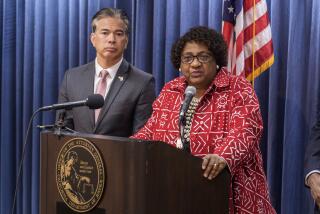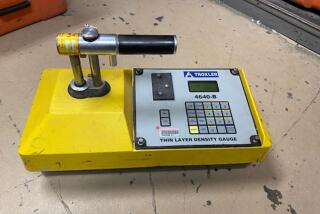Dirty-bomb material bought in GAO sting
- Share via
WASHINGTON — Congressional investigators set up a bogus company with only a postal box and within a month obtained a license from the Nuclear Regulatory Commission that allowed them to buy enough radioactive material for a small “dirty bomb.”
Sen. Norm Coleman (R-Minn.), who will ask the NRC about the incident at a Senate hearing today, said the sting operation raised concerns about terrorists obtaining such material just as easily.
Nobody at the NRC checked whether the company was legitimate and an agency official even helped the investigators fill out the application form, Coleman said Wednesday.
The Nuclear Regulatory Commission acknowledged that more checking was needed in such licensing, and said that since being told of the Government Accountability Office sting operation, it had tightened licensing procedures.
“We’ve fixed the problem,” said NRC Commissioner Edward McGaffigan. He said that such licenses now would require visits to the company, or in some cases company officials would have to come to NRC offices.
The license that was obtained allowed for the purchase of as many as five portable moisture-density gauges widely used in construction, in which are encased small amounts of cesium-137 and americium 241, two highly radioactive isotopes.
Individually, these devices pose little threat because of the small amount of radioactive material, radiation experts say. Still, the devices require an NRC license to be purchased and must be closely safeguarded by companies that use them to avoid theft.
But the investigators from the GAO, Congress’ investigative arm, found a way to purchase as many as 45 of the gauges and could have bought more because they duplicated the NRC-issued license and removed restrictions on the amount that could be purchased.
“With patience and the proper financial resources, we could have accumulated from other suppliers substantially more radioactive source material than what the two supplies initially agreed to ship to us,” says the GAO in a report prepared for today’s hearing.
Coleman, the ranking Republican on the homeland security and governmental affairs investigations subcommittee, said the NRC “still has this good-faith assumption. The problem is there are bad-faith people out there.”
He said “there is no question” they could have obtained enough radioactive material to make a dirty bomb because the GAO duplicated the certificate and no one checked on the company or whether the counterfeit license was legitimate.
A dirty bomb could spread radiation by a conventional explosion. Experts believe such a bomb would not cause casualties beyond the range of the explosion.
More to Read
Sign up for Essential California
The most important California stories and recommendations in your inbox every morning.
You may occasionally receive promotional content from the Los Angeles Times.










